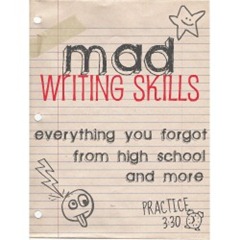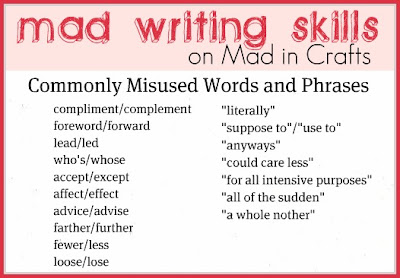In a continued effort to improve my writing, I have been researching which words are most often misused in blogging. Turns out, inconceivable is not one of them.
HOMOPHONES
Homophones are two words that sound the same when spoken but that have two different meanings. Homophone errors can sneak past even the most thorough proofreading if the eye isn’t looking out for them, so it is good to have a refresher on which homophones are most often used in craft blogging.
Compliment/Complement –
A compliment is a nice thing said to another person. A complement is something that goes well with, or completes, another thing.
The reader left me a lovely compliment in the comments.She said that the cream suede fabric complemented the dark wood perfectly.
Foreword/Forward –
A foreword is an introduction to a book. Forward is a direction.
The foreword to the book was written by Martha Stewart.She says the best artists are always moving forward, not looking back.
Lead/Led –
Lead (pronounced with a short e) is a metal. Led is the past tense of “lead” (pronounced with a long e), meaning to guide.
My son was picking the lead paint off of the walls.I quickly led him out of that old house.
Who’s/ Whose –
Who’s is a contraction of “who is.” Whose is a possessive pronoun.
Who’s going to link up to my link party?Whose link party are you joining?
.
TRICKY, TRICKY, TRICKY
Some pairs of words are tricky either because they almost sound alike or just because people misuse them so often that we get used to hearing the wrong thing! Watch out for these buggers:
Accept/ Except –
Accept means to receive or agree to something. Except means to exclude something.
She accepted the constructive criticism graciously.All of the comments were positive except one.
Affect/Effect –
Affect is a VERB meaning to make a change. Effect is a NOUN defined as the consequence of a cause.
I wonder how the Mod Podge will affect the homemade paper.You can use plain Elmer’s Glue to create a crackle effect.
Advice/ Advise
Advice is a NOUN meaning an opinion or recommendation. Advise is a VERB meaning to give an opinion or recommendation.
I took the manufacturer’s advice and let the stain cure for 24 hours.I advise you to wear plastic gloves when staining the bookshelf.
Farther/ Further –
Use farther when speaking about distance. Use further when you mean “more” or “in addition to.”
Extend the edging two inches farther than the end of the table runner.You may need further stitching to keep the applique in place.
Fewer/Less
Use fewer when speaking about specific quantities that can be counted. If you are speaking about amounts (things that can’t be counted), use less.
The bridesmaids dress has fewer sequins than the bridal gown.However, the lack of sequins doesn’t make the dress any less ugly.
Loose/Lose
Loose is the opposite of tight. Lose is the opposite of find.
Make a loose bow at the top of the wreath.If you lose the ends of the ribbon, let go and start again.
“WATCH YOUR PHRASEOLOGY”
Some of these phrases tend to be used in an ungrammatical fashion, and others are just plain wrong. Each italicized example will use the phrase correctly.
ERROR: “Literally”
Literally means “exactly and without exaggeration.” Most people actually ARE exaggerating when they use the word. Misusing “literally” will really get the grammar police on your heiney.
He literally ran down the airport terminal to catch his flight.
ERROR: “Suppose to/Use t0”
The verb in each of these phrases should be in the past tense. Don’t forget the “d.”
The writing prompt says I am supposed to tell my readers what I had for breakfast.
ERROR: “Anyways “
People might SAY “anyways,” but it is not grammatically correct.
But I don’t think I will tell them what I ate anyway.
ERROR: “Could care less”
If you couldn’t care less, that means you care the absolute minimum amount possible. You are saying you basically do not care at all. If you could care less, you might actually care quite a bit.
My readers couldn’t care less that I had Cheerios today.
ERROR: “For all intensive purposes”
The correct phrase is “for all intents and purposes.”
ERROR: “All of the sudden”
The correct phrase is “all of a sudden.”
ERROR: “A whole nother”
In real life, I say “a whole nother” all the time. I know it’s wrong, but I like it. What is a nother? What is a partial nother? “A different story entirely” is a grammatically correct replacement.
AS ALWAYS, the Mad Writing Skills Series is meant to be aid to those looking to brush up on their blog writing skills, in the same way a Ways to Take a Better Picture series would be meant to help improve photography skills. Perhaps due to some early elementary school traumas, many people get all twitchy when grammar errors are brought up.
.
Fear not, gentle readers, this is all done in support and love, and not to impose rules and regulations on the bloggy world.
.
And I promise not to make you stay after class and bang erasers.












These are great. I wish more bloggers would read and apply the lessons you've shared!!! I think you should also address then/than, your/you're & the correct spelling of "voila".
This was a great one! I know I use affect/effect wrong. Hopefully now I can remember the difference. Could you say, "whole other story?" It think that is what the phrase is, it just comes out sounding like "nother" when speaking.
I didn't know about compliment/complement! I am not sure how I've gone my whole word-loving life without knowing it, but I am so excited to have learned something new today!! I love this series 🙂
I used to teach grammar in elementary school and you even reminded me of a couple rules I forgot about. Great post, thanks! 🙂
This post made me lol, which I know wasn't your intention. I see so many of these mistakes on blogs, a few don't bother me but it does get on my nerves if more words are spelled wrong than they are right! I know I make mistakes myself, I am not saying I am perfect by the way! 🙂 Have a lovely day!
Am I a total geek because I completely loved ready this post?Megan http://www.CutTheCraft.com
Love this post! "All of the sudden" has always bugged me — so glad you included it!
You should think about distributing a cheat sheet on this one. Good stuff. I always struggle with effect/affect, although, I have given up on ever using the term "literally" because people go all grammar gestapo, even when used in a perfectly appropriate situation. Pssssh!My personal pet peeves are using "impact" as a verb, and "ironic" when it's just a coincidence.I see "your" and "you're" swapped on blogs at least once day, and occasionally, sometimes even my own blog. Sigh. These are the times we live in. We all forget from time to time….so thanks for the reminder. I need to step up my game!
Very good. But, you missed a very common, therefore egregious, one: your vs. you're. Right?
I wrote about a few other frequently misused words in my Grammar post: <a href="http://madincrafts.blogspot.com/2011/02/mad-writing-skills-grammar.htmlhttp://madincrafts.blogspot.com/2011/02/mad-writi… />Then/than and your/you're are both dealt with there.
My least favorite error is a lot/alot/allot…drives me crazy! Thanks for the post…
I tried to figure a way to send this privately,but I'm not techy enough to succeed , so, here goes:" In an continued effort to improve my writing," should read " In a continued effort…" , as the a precedes a consonant and not a vowel. Even though it does modify 'effort', it doesn't immediately precede a word beginning with a vowel. 🙂 It may make you feel somewhat better to know I had to spell check 2 words and erase and retype an entire section of all caps in this short comment! For your posts , which I've shared with my teens, I thank you.Hopefully, sharing our specific skills will give us all a boost up the ladder of great writing!
Ack! Thanks for catching that! Way to start out a grammar post with a grammar error, Jess. Sheesh.
Another one that bugs me is "one of the only". "Only" is singular, and it takes no modification. "One of the few" is correct, meaning an item or instance is rare. "One of a handful" is metaphoric and means "one of the few".People say "penultimate" meaning "ultimate". "Pen-" means "next to", and "ultimate" means "last." So "ultimate" means "last" or "latest"–> "The ultimate in fashion" means "the latest fashion that has been created." "Penultimate" is, perhaps, "last year's fashion." Or, as some kids might say, "Oh, that is so last week!"(And also Arthur Pendragon literally means Arthur Next to the Dragon. In my opinion it would probably be "Before the Dragon" meaning faced off to fight this dragon. Maybe. Any Heralds out there that know?)And then there is antepenultimate, which means (ante- "before") "before the next to last." So if you are the antepenultimate winner to an Olympic event, you get a bronze medal. Penultimate Olympic winners get silver. And, of course, the ultimate gets gold.